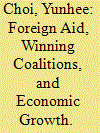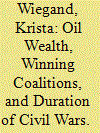| Srl | Item |
| 1 |
ID:
192235


|
|
|
|
|
| Summary/Abstract |
This paper examines the conditional effectiveness of foreign aid for economic growth. Theoretically, I argue that to maximize the chance to stay in office, the leaders of a large winning coalition will spend the aid money as intended, to provide public goods, which aids economic growth. On the other hand, leaders of a small winning coalition will spend the money on private goods, which is less effective for growth. To test this argument, I construct a panel data set for 28 Asian countries (1990–2010) and apply the generalized method of moments. I find that the interaction between ODA and coalition size significantly affects economic growth. Broadly, for large winning coalitions, growth rate increases with higher ODA, while for small winning coalitions it decreases with higher ODA.
|
|
|
|
|
|
|
|
|
|
|
|
|
|
|
|
| 2 |
ID:
165266


|
|
|
|
|
| Summary/Abstract |
New research has begun to underscore the complicated relationship between democratic institutions and the duration of civil wars. Specifically, greater constraints placed on executives often lead to considerably longer civil wars as leaders are limited in how they bargain with dissidents. This presents a puzzle as democracies are often seen as credible negotiators in international disputes. This article suggests that the size of the government’s winning coalition represents a double-edged sword. Larger winning coalitions allow governments to bargain more credibly but also place constraints on what governments can offer since peace agreements may alienate coalition members. Fortunately, future access to postwar oil wealth provides the feasibility for the governments to compensate hard-liners who may lose out on any settlement, making them more likely to allow concessions to rebels. This combined credibility of large winning coalitions and the feasibility provided by oil wealth allows for peace agreements, therefore shortening the duration of civil wars. We test these propositions by examining the conditional relationship between oil wealth and coalition size on the duration of all civil wars between 1950 and 2009.
|
|
|
|
|
|
|
|
|
|
|
|
|
|
|
|